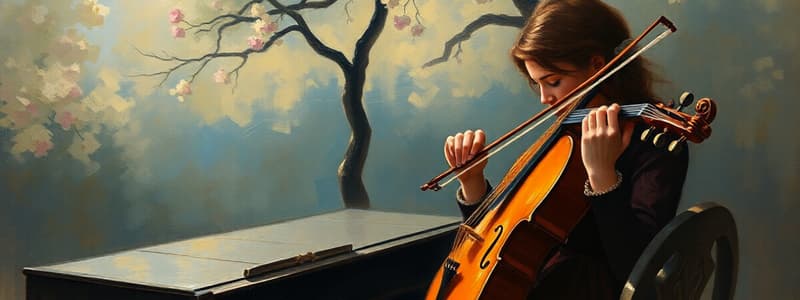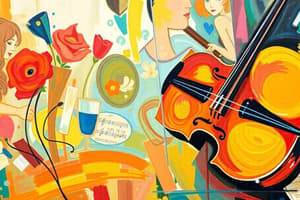Podcast
Questions and Answers
Which characteristic is NOT associated with the music of the Romantic period?
Which characteristic is NOT associated with the music of the Romantic period?
- Incorporation of folk tunes
- Focus on technical complexity (correct)
- Expressions of nationalism
- Emphasis on beautiful tone and elegance
At what age did Niccolo Paganini switch from mandolin to violin?
At what age did Niccolo Paganini switch from mandolin to violin?
- 8 years old
- 6 years old
- 5 years old
- 7 years old (correct)
Which of the following works is NOT attributed to Frederic Chopin?
Which of the following works is NOT attributed to Frederic Chopin?
- Fantasie in F minor
- Polonaise
- Hungarian Rhapsodies (correct)
- Revolutionary Etude
Which statement about Robert Alexander Schumann is true?
Which statement about Robert Alexander Schumann is true?
What is Niccolo Paganini best known for?
What is Niccolo Paganini best known for?
Which composer is notably called the 'Poet of the Piano'?
Which composer is notably called the 'Poet of the Piano'?
What was a significant influence on Franz Liszt's decision to become a virtuoso pianist?
What was a significant influence on Franz Liszt's decision to become a virtuoso pianist?
Which Romantic composer achieved fame as both a composer and a music critic?
Which Romantic composer achieved fame as both a composer and a music critic?
Flashcards
Romantic Period in Music
Romantic Period in Music
A period in Western music history spanning the late 18th to 19th centuries, emphasizing emotional expression, individualism, and national identities.
Nationalism in Romantic Music
Nationalism in Romantic Music
The use of folk melodies, styles, and heroic figures that represent a composer's cultural, political, and social background in their music.
Performance Practice
Performance Practice
The study of how music was performed and created during a specific era, including instrumentation, techniques, and performance practices.
Niccolo Paganini
Niccolo Paganini
Signup and view all the flashcards
Frederic Chopin
Frederic Chopin
Signup and view all the flashcards
Franz Liszt
Franz Liszt
Signup and view all the flashcards
Robert Schumann
Robert Schumann
Signup and view all the flashcards
Symphonic poem
Symphonic poem
Signup and view all the flashcards
Study Notes
Romantic Period Music
- Romantic music spanned the late 18th to 19th centuries.
- Nationalistic elements were prominent, featuring folk tunes, styles, and heroes reflecting the composer's cultural, political, moral, and social views.
- Europe, especially Germany, saw the dominance of Romantic music.
- Performance practice, encompassing how music was performed and created, was important.
Violin and String Music
- Niccolò Paganini, an Italian virtuoso, was renowned for his violin skills.
- He started playing mandolin at six and violin at seven, quickly surpassing his teachers.
- Famous works include La Campanella, The Carnival of Venice, and the 24 Caprices for Solo Violin, Op. 1.
Piano Music
-
Frédéric Chopin was a gifted pianist appearing at age four and composing polonaises at seven.
-
Nicknamed the "Poet of the Piano," his music was graceful, elegant, rhythmically flexible, and beautiful in tone.
-
Chopin's Polonaises and Mazurkas expressed his love for Poland.
-
Famous works include Polonaise, Fantasie in F minor, and Revolutionary Etude.
-
Franz Liszt was known for his symphonic poems, translating literary works into music.
-
He created transcriptions of operas, famous symphonies, and piano pieces.
-
Inspired by Niccolò Paganini's violin virtuosity, Liszt dedicated himself to piano performance.
-
Famous works include Hungarian Rhapsodies (popularly known for "Tom & Jerry" cartoon), Liebestraume No. 3.
-
Robert Schumann, a composer and critic, combined music and words to great effect.
-
Despite his father's legal aspirations, he pursued musical and literary circles, guided by Friedrich Wieck.
-
Famous works include Kinderszenen, Opus 15, Abegg Variations, Opus 1, and Carnaval, Opus 9.
Studying That Suits You
Use AI to generate personalized quizzes and flashcards to suit your learning preferences.




